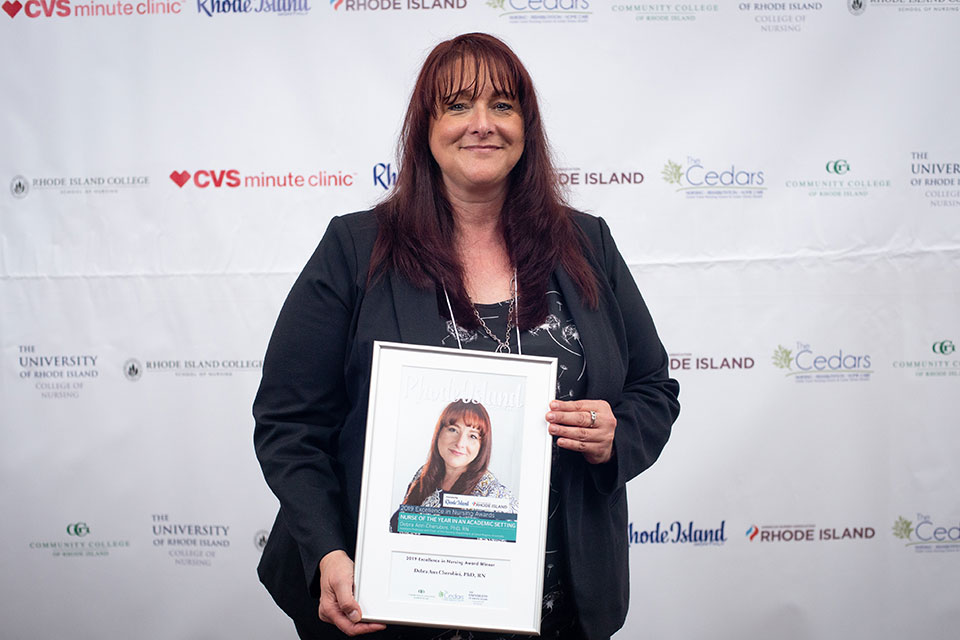Cherubini named nurse of the year by Rhode Island Monthly

Photo courtesy of Blueflash Photography
Dr. Debra Cherubini, assistant professor and chairwoman of the Department of Nursing, was recently named “Nurse of the Year in an Academic Setting” by Rhode Island Monthly as part of the magazine’s annual Excellence in Nursing Awards.
This year’s awards honored 13 nurse practitioners, nurse educators, home health nurses and student nurses. In conjunction with the Rhode Island State Nurses Association, the nurses were nominated by their peers and selected by a panel of nursing professionals and educators.
Editor’s note: The following interview with Cherubini is excerpted from the September issue of Rhode Island Monthly.
How did you get into nursing?
When I was growing up, my family urged me to select a job that would always provide employment. I was interested in the medical field; I remember doing experiments and science projects in the basement of my home. I wanted a job that would be challenging and allow me to help people. While I was in high school, I trained to become a certified nurse’s aide to gain experience and to see if I would like the field of nursing. I have loved caring for people ever since.
What is your favorite part of your job/nursing in general?
The students, of course! It is wonderful to see students achieve that “a ha” moment when everything that they have learned clicks and they understand the importance of the application of the knowledge and clinical skills they have learned. I [also] graduated from the nursing program at Salve Regina. I still remember my own “a ha” moment.
Tell us about an accomplishment from your career that you are most proud of and/or found to be the most rewarding.
The accomplishments that I am most proud of are serving my country as a Navy nurse for 20 years, caring for service men and woman on deployment and earning my doctoral degree. I received outstanding medical training in the Navy. I developed a confidence that supported me when dealing with any challenge in my life. On deployment, you are very aware that someone is waiting for your patient to come home. I have always remembered that and it ensured that I, and all the personnel that worked with me, remained current with the medical skills needed on deployment. I felt the same way when working on my Ph.D. in nursing education. It is important that I maintain the skill set that an educator would need to facilitate a program that produces competent and compassionate nurses.
Tell us about a stand-out memory or a formative experience from your nursing career.
About a year ago, my son was very ill and admitted to Newport Hospital. My son has cerebral palsy and cannot speak, walk or eat, and must rely on someone to care for his every need. The nursing care he received was outstanding. All of the nurses treated my son as if he was their family. One night, he needed a new IV started. A few attempts were made, but my son was very ill and it was difficult to place the new IV. They called for a nurse to come up from the ICU to attempt to start his IV. It was a very stressful moment. The nurse from the ICU arrived and, to my surprise, she was one of my former students. She took my hand and told me she knew how much I loved my son and that she would do her very best to care for him. You know what? She placed the IV, first try. I was overwhelmed with pride. It was very humbling to see one of my students so confident, compassionate and professional.
What advice would you give to an aspiring nurse?
Nursing school is a rigorous academic journey. The curriculum is very demanding, intense and challenging. Nurses cannot only memorize information; application of this knowledge is required to develop clinical competency. Nursing is a profession that requires continuous education to maintain knowledge of current nursing practice. Florence Nightingale once said, “Let us never consider ourselves finished nurses. We must be learning all of our lives.” Continual academic development is key to practice and professional development.

